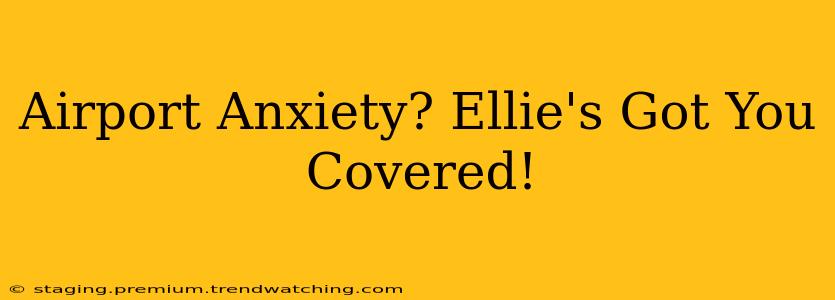Flying can be exciting, but for many, the airport experience itself is a significant source of stress. Long lines, security checks, potential delays – it's a recipe for anxiety. But don't worry! This guide, written by Ellie, a seasoned travel expert and anxiety management coach, will equip you with the tools and strategies to navigate the airport with confidence and ease. We'll cover everything from pre-flight planning to in-airport coping mechanisms, ensuring a smoother journey from curb to gate.
What Causes Airport Anxiety?
Airport anxiety isn't simply about the fear of flying (aviophobia). It encompasses a range of stressors specific to the airport environment. These can include:
- Crowds and confined spaces: The sheer number of people, combined with often crowded waiting areas, can be overwhelming for those with social anxiety or claustrophobia.
- Security checkpoints: The process of removing belongings, going through scanners, and potentially facing extra scrutiny can be highly stressful and anxiety-inducing.
- Time constraints and potential delays: The pressure of making connections, adhering to strict schedules, and the uncertainty of potential delays significantly contribute to airport anxiety.
- Loss of control: The feeling of being at the mercy of external factors—flight cancellations, baggage handling issues, etc.—can be incredibly frustrating and anxiety-provoking.
- Unfamiliarity with the airport: Navigating an unfamiliar airport layout, locating gates, and finding amenities can add to the overall stress levels.
How Can I Reduce My Airport Anxiety?
This is a question many people ask, and the answer involves a multi-pronged approach:
1. Plan Ahead to Minimize Stress:
- Check-in online: Avoid lengthy queues by checking in online and printing your boarding pass in advance.
- Arrive early (but not too early!): Give yourself ample time to navigate the airport and complete security procedures, but avoid excessive waiting which can heighten anxiety. Aim for arriving 2-3 hours before a domestic flight and 3-4 hours before an international flight.
- Pack smart: Organize your belongings meticulously to expedite the security process. Ensure liquids are in compliant containers and easily accessible.
- Familiarize yourself with the airport layout: Check the airport website's map to plan your route from the entrance to your gate.
2. Manage Your Anxiety During the Airport Experience:
- Practice relaxation techniques: Deep breathing exercises, mindfulness meditation, or progressive muscle relaxation can help calm your nerves during stressful moments.
- Bring comfort items: A favorite book, noise-canceling headphones, or a comforting blanket can provide a sense of security and reduce sensory overload.
- Stay hydrated and nourished: Dehydration and hunger can exacerbate anxiety. Bring a reusable water bottle and healthy snacks.
- Engage in distractions: Listen to music, read a book, or play a game on your phone to divert your attention from anxious thoughts.
- Seek support: If you're feeling overwhelmed, don't hesitate to ask airport staff or other passengers for assistance.
3. What if I Have a Panic Attack at the Airport?
While preparation can greatly minimize airport anxiety, a panic attack can still occur. If this happens, remember to:
- Find a quiet space: Locate a restroom or less crowded area to give yourself some space.
- Practice deep breathing: Focus on slow, deep breaths to regulate your heart rate.
- Ground yourself: Pay attention to your surroundings, noticing the sights, sounds, and sensations around you.
- Reach out for help: Don't hesitate to seek assistance from airport staff or a medical professional if needed.
4. Consider Therapy or Medication:
If airport anxiety significantly impacts your travel plans and quality of life, consider professional help. A therapist can provide strategies for managing anxiety, and a doctor might recommend medication to help alleviate symptoms.
How Long Before a Flight Should I Arrive at the Airport?
The ideal time to arrive at the airport depends on several factors:
- Domestic vs. International flight: International flights require more time for security and customs procedures.
- Airport size and layout: Larger, more complex airports require more time to navigate.
- Your comfort level: If you're prone to anxiety, allow yourself extra buffer time.
As a general guideline, aim for 2-3 hours before a domestic flight and 3-4 hours before an international flight.
What are the Security Procedures at the Airport?
Airport security procedures are designed to ensure passenger safety. These typically include:
- Baggage screening: Your carry-on and checked bags will be screened for prohibited items.
- Passenger screening: You'll pass through a metal detector or body scanner.
- Liquid restrictions: Liquids, gels, and aerosols must be in containers of 3.4 ounces (100ml) or less and placed in a clear, quart-sized bag.
Specific procedures may vary depending on the airport and security regulations. Consult your airline or the airport's website for detailed information.
By following these tips and strategies, you can significantly reduce your airport anxiety and enjoy a more relaxed and enjoyable travel experience. Remember, preparation is key, and seeking professional help if needed is a sign of strength, not weakness. Safe travels!

